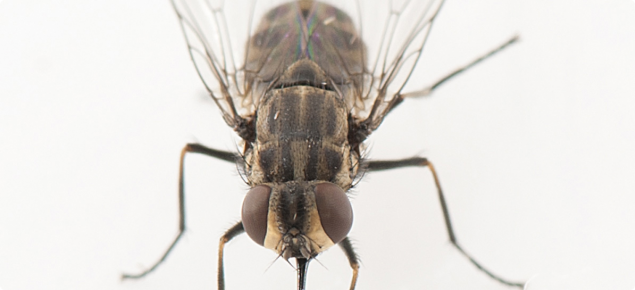One hazardous downside of using raw manure is fly breeding, which can also occur in uncovered compost heaps. Allowing flies to breed can cause a nuisance to neighbours and constitute an offence under the Fly Eradication Regulation administered by the Department of Health Act 1911.
In the metropolitan area, stable flies are a menace to livestock and pets living on the Swan Coastal Plain north and south of Perth, and everyone needs to work to minimise their breeding. Stable flies are blood-sucking insects which attack animals and humans. Composting of organic materials prevents fly breeding.
The Department of Primary Industries and Regional Development is the custodian for new regulations aimed at managing stable flies. New regulations under the Biosecurity and Agricultural Management Act are based on community consultation and research and aim to reduce fly numbers in outer metropolitan shires.
Stable fly
The stable fly feeds on blood making it a destructive pest, especially for horses and cattle, where biting can lead to agitation, weight loss and general wellbeing issues.
Stable flies breed in rotting vegetation including horticultural waste, livestock bedding and decomposing poultry manures in contact with the soil. Both male and female flies need blood to enable them to mate and lay eggs.
With the shires and cities of Wanneroo, Swan, Joondalup, Gingin, Chittering, Kalamunda, Armadale, Rockingham, Cockburn, Harvey, Kwinana, Serpentine-Jarrahdale, and part of the Shire of Murray, the transportation of poultry waste and its use as horticulture manure are banned at all times of year unless it is treated to stop stable fly breeding.
Horticultural growers should not allow crop waste to rot on the ground as it breeds stable fly. Horticultural waste fed to animals like cattle should be spread across the paddock or placed in troughs and cannot be left to rot in piles on the ground for livestock to eat.
Outbreaks of stable fly should be reported to the local shire.

